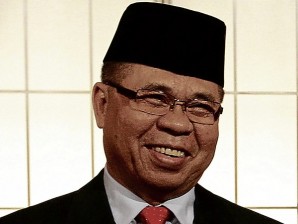CAMP DARAPANAN, Maguindanao, Philippines—The top leadership of the Moro Islamic Liberation Front (MILF) sees no problem should government’s chief negotiator leave the negotiating table for the Supreme Court bench.
“It is not a question of personality although that plays an important role. (Rather) it ultimately boils down to the policy of the principal,” said MILF chief Murad Ebrahim during press conference over the weekend.
“Although, we really want Marvic to stay (as chief negotiator),” added Murad.
Mario Victor Leonen, more known as Marvic, is a candidate for associate justice of the high court to fill the seat vacated by Maria Lourdes Sereno when she assumed the office of the Chief Justice.
When interviewed by the Judicial and Bar Council (JBC), Leonen assured the public that his possible appointment to the Court would not hamper the peace process between the Philippine government and the MILF.
The JBC prepares the shortlist of candidates from which the President shall pick the next Supreme Court associate justice.
While the executive branch of the Philippine government and the MILF already signed the Framework Agreement on the Bangsamoro last October 15, negotiations will be held on the details of power-sharing, wealth-sharing, intergovernmental relations, and normalization.
The peace panels are set to meet mid-November in Kuala Lumpur to finish the negotiations and craft the comprehensive peace agreement by the end of 2012.
David Gorman of the Center for Humanitarian Dialogue (CHD) has said that both Leonen and MILF chief negotiator Mohagher Iqbal “demonstrated the critical combination of tenacity and creativity in finding common ground, yet never failed to represent their Principals’ interests” in the negotiations.
Gorman represents the CHD in the International Contact Group (ICG) of the Mindanao peace process, allowing him to closely observe the dynamics of the negotiations.
Iqbal himself found comfort in interacting with Leonen whom he described as “articulate and amiable.”
Leonen was dean of the University of the Philippines College of Law when President Aquino tapped him to lead the government negotiating panel in 2010.
As government panel chair, Leonen has advocated an exploration of the flexibilities in the 1987 Constitution to accommodate the Moros’ aspiration for self-governance.
In its original proposal, the MILF rooted for amendments to the country’s Constitution to entrench the self-governance entity it sought established for the Moro people.
But Murad admitted that the MILF gave credence to the assurances of the Leonen panel that a Bangsamoro autonomous region with more powers than the Autonomous Region in Muslim Mindanao could be established within the confines of the Constitution.
Leonen’s working knowledge of the history and dynamics of the Moro conflict served him well in leading the government panel to craft its negotiating positions.
“We accept the framework of the MILF (that) the kind of negotiation that we are to continue should be… how to solve the Bangsamoro problem,” Leonen declared during his early days as chief negotiator.
“Only by virtue of problem-solving can we really have a sincere chance of being able to bring about peace,” he added.
Murad has characterized the framework agreement, which principally recognizes Bangsamoro identity, as “a win-win solution to the sovereignty-based conflict that has pitted the ideology of Philippine national sovereignty and territorial integrity against the inalienable right of the Bangsamoro people to self-determination.”
